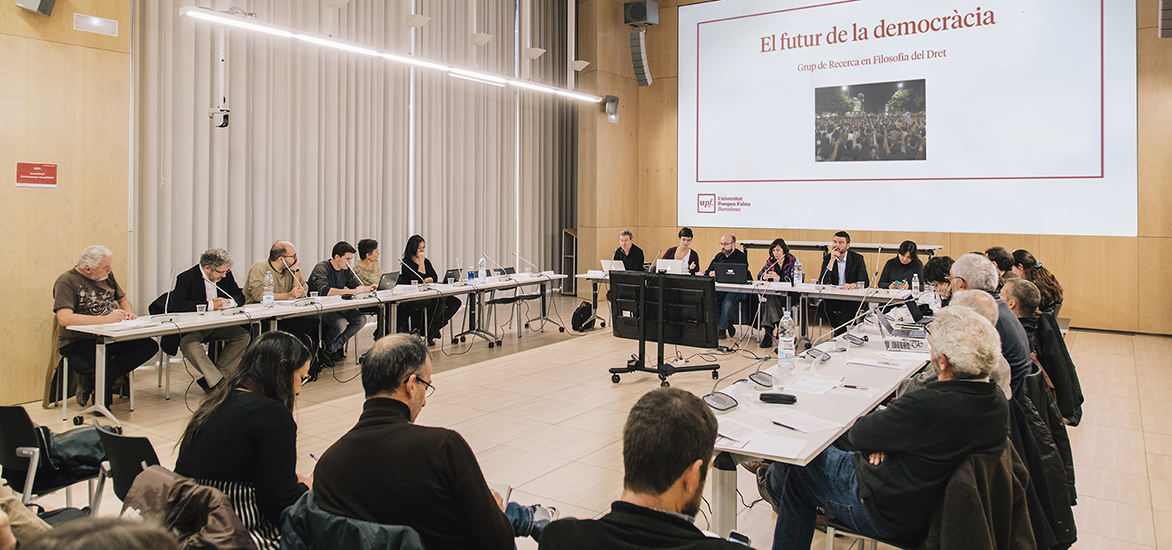Finance and governance
«A quality public service in a context of transparency and accountability.»

UPF’s asset and financial structure is sound, despite having suffered the consequences of the recent economic crisis. However, in the field of economic sustainability, certain major challenges still need to be addressed. In this regard, we need to promote more intensively an overarching strategy for generating financial resources, to be shared by the institution as a whole. Currently, the Catalan public financing system for universities does not recognize neither UPF’s specific status as a leading research university nor its very good teaching outcomes, despite the special financial needs to which the UPF performance gives rise. As a research-intensive university, UPF must make a financial effort that can compromise its current budget. It is therefore essential to find alternative funding sources and to promote the involvement of the entire community to make the university economically viable. In this regard, all of the university’s bodies and stakeholders must jointly adopt a proactive attitude that makes it possible to ensure UPF’s sustainability as a collective long-term project.
In the sphere of governance, the university is currently in the process of making major changes to its internal organization.
On the one hand, new coordination units are being established to make it possible to manage each academic area in a more integrated way. On the other, the role of the university’s general services is being redefined; they are being reoriented towards the promotion of more effective, quality university policies. In this context, the expectation remains that changes will be made in the environment that will enable the implementation of new transformations in governance, gains in autonomy, and the generation of a context more conducive to UPF’s development.
It is thus necessary to work decisively to consolidate the changes that have already been initiated, remaining at all times committed to transparency and to making processes more flexible, with the aim of implementing a ‘smart’ organizational model that promotes the capacity for collective learning and responds to the willingness to be accountable to society. Finally, in order to ensure the success of this entire process, UPF needs efficient evaluation mechanisms that make it possible to identify areas of improvement and act accordingly.
«A smart, flexible organization, with new forms of management sustained on a project-based and collective learning culture.»
Finance and governance strategies
To promote organizational changes in order to facilitate the university’s governance:
Further decentralizing the university with a view to making resource management more flexible, and flattening the governance structure, with a transparent and comprehensible internal financing model that is easy to manage and govern and that also encourages the seeking of external funding.
Adopting teamwork procedures sustained on a project-based culture as one of the university community’s basic working methods. As a natural process of learning and experimentation, a project-based culture will allow a series of actions pursuing specific goals to be carried out in a more effective way.
Activating general services aimed at promoting and assuring quality which are given the appropriate tools and incentives to implement the quality policies adopted by the university.
Taking measures to simplify the governance structures that make it possible to reduce the number of committees and govern with fewer academic officials, strengthen the role of management professionals at the various levels of the organization, and allow academic administrators to focus on the relevant areas of decision-making.
Working to achieve the digital transformation of the university, taking advantage of technological tools that make it possible to obtain and use the data required for decision-making and implementing an innovative and ethically responsible organizational culture.
Focusing on the evaluation of programmes and services, by means of a careful analysis of processes and outcomes, to allow a better accountability and transparency and to facilitate the critical review of the university’s operations. This will permit us to implement the resulting proposals for change, as well as to put the appropriate incentives in place to encourage continuous improvement.
Agreeing on common criteria for academic careers that make it easier to attract and retain talent, help to facilitate work-life balance, and ensure that young faculty can gradually achieve independence. These criteria must be adaptable to the recruitment and promotion processes for the different disciplines and must be consistent with internationally recognized quality models, such as the tenure-track system.
Establishing more diverse career paths, for both academic and management staff, with clearly established criteria for promotion, the opening of different formulas to increase mobility and professional motivation, and adequate remuneration.
Creating an International Advisory Board for the university directly linked to the Office of the Rector and composed of distinguished members, tasked with offering guidance with regard to leadership, quality and innovation strategies and with helping to raise UPF’s international profile.
To ensure the necessary financial stability to maintain the quality of the public service:
Offering new teaching and training activities that make it possible to increase the academic offering as a whole, attract students from outside the EU, promote an integrated offering of summer courses, make better use of the university’s own infrastructure (for events that are not directly related the university’s activities) and promote transfer and innovation activities.
Seeking out and encouraging new opportunities to obtain improvements in funding for research, whether by trying to influence public authorities in this regard – to achieve an increase in results-based funding – or through national and international sponsorship arrangements with all types of institutions.
Creating innovative means of funding, for example, increasing the incentives for potential donors, and especially alumni – by increasing the visibility of the results of their donations– or by establishing partnerships with corporate sponsors. In this regard, micro-finance and sponsorship are also funding sources that should be explored.
Revising the structure of the UPF Group to strengthen synergies and find spaces for collaboration, as well as to increase the visibility of the group as a whole, in order to strengthen the entire university and contribute to its sustainability.

Some measures of success
- To implement, over the course of the 2016-2020 period, a model for a project culture and a system of goal-based task performance throughout the university.
- To increase, over the course of the 2016-2025 period, external investments in educational and research infrastructure on the campuses, based on UPF’s attractiveness as an academic institution.
- To double, by 2020, the percentage of funding resources derived from activities directly related to the university’s internationalization.
- To increase the institution’s total turnover by at least 20% in real terms by 2025.
- To reduce the number of elected and appointed academic officers by 25% by 2025 through the professionalization of management.
